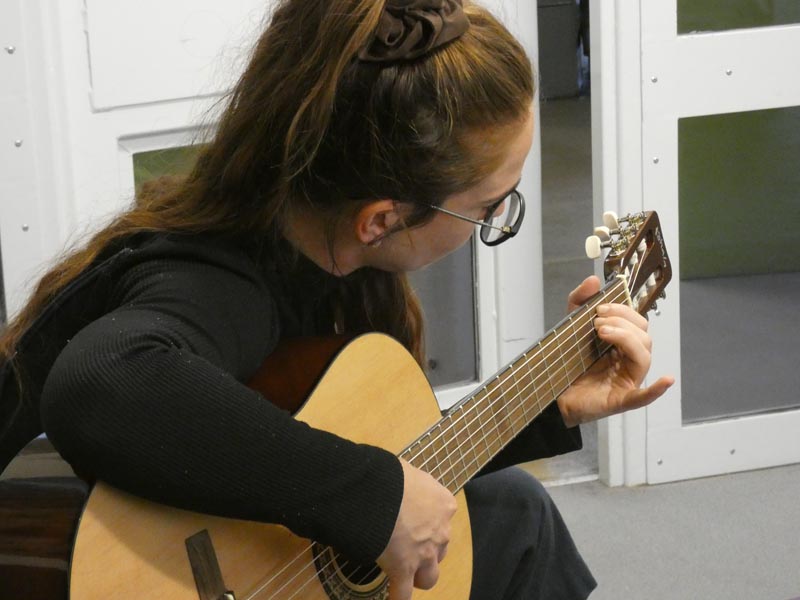
So far, songs from the movies Frozen and Moana have not made it into the folder of music that music therapist Ella Polczyk takes with her to twice-weekly sessions at Hawkes Bay Regional Prison.
But she’d be completely up for it if they did. Ella, who manages the Hawkes Bay branch of the Raukatauri Music Therapy Centre, says music therapy is all about flexibility. And while none of the tāne from the prison’s Intervention Support Unit have expressed any interest in singing or dancing to the songs that captivate the tamariki she works with, there’s always a first time.
“I shouldn't write off Frozen. Who knows, there might be someone at the prison who would love me to play that,” she says with a laugh.
Creative Arts and Cultural Wellbeing Prison Initiative
Ella’s programme at Hawkes Bay Regional Prison is one of two prison-based programmes being run by Raukatauri Music Therapy Centre; the other one is in two units – Kia Mau Kia Matara unit and Te Honongo unit – at Auckland Prison. They’ll run between 2023 and 2025, and are among a dozen programmes funded through the Creative Arts and Cultural Wellbeing Prison Initiative, a $3 million fund offered by Manatū Taonga in partnership with the Department of Corrections.
Since Ella started working at the prison on Monday and Friday afternoons in late March, the number of songs in her folder has increased dramatically – all requested by the tāne themselves. They range from Billie Eilish and the Bee Gees to Prince and U2, with a good helping of rap, which Ella is enjoying learning more about.
“There's such a mix of artists and genres and songs. It’s always a really exciting part of my job.”
What they do with those songs during a session is entirely up to the tāne.
“Some people want to talk and listen and will choose songs for me to sing, which is fine. And some want to play along with me on the guitar, singing from our song book.”
Breaking into a spontaneous breakdance
It’s not unknown for a tāne to break into a spontaneous breakdance – and that’s fine too.
“Music’s got such a way of bringing people into the present and connecting and bringing you back into your body, especially when you're playing or singing or dancing,” Ella says.
Whatever they do together during their sessions, which are mostly one-to-one, the goal is the same – to use the tāne’s inborn responsiveness to music to help them grow and heal.
“Music therapy is the planned use of music to assist in the healing and growth of people with emotional, intellectual, physical or social challenges. As music therapists we’re working with people where they are at, and we want them to feel unconditional positive regard – to feel heard, to feel seen and to feel listened to.”
Working with talented musicians
It’s not necessary for people attending a music therapy session to have any musical training although as it happens many of the tāne Ella works with at the prison are extremely talented musicians.
“Most of the guys are incredibly musical. They've either played instruments before, or they love singing, or they've just got amazing rhythm.”
Comments from two of the participants are:
- “What the music programme does for me is it helps me focus on things I need to do to change and reflect on how I can make better decisions to stop me from doing wrong!”
- “It’s good to listen to music and forget about the outside world. I forget about everything that’s going on but I also come back to reality too.”
The current Hawkes Bay Regional Prison programme follows a six-month pilot programme run at the prison by Raukatauri Music Therapy Centre in 2019. At the time, prison officers observed that music therapy provided opportunities for the men to engage, express and reflect. It also reduced negative behaviours, anxiety and mental health symptoms, and improved the overall atmosphere of the unit.
Positive changes among the tāne
Ella has noticed similar changes since she started working at the prison in March – and so have the staff.
For Ella, one of the signs that the programme is working is the fact that tāne often arrive at a session with a song they’ve written since the last session. It means they’ve been thinking about the music during the week and keeping their minds occupied with something positive.
“It’s been really great to hear from the staff about their experience of the programme and the changes they see,” Ella says. “Particularly about how open the tāne are to music making and having conversations about what we’ve been doing. They say they’ve seen positive changes, such as more hopefulness and just feeling generally more positive, having a bit more purpose to what they're doing.”


